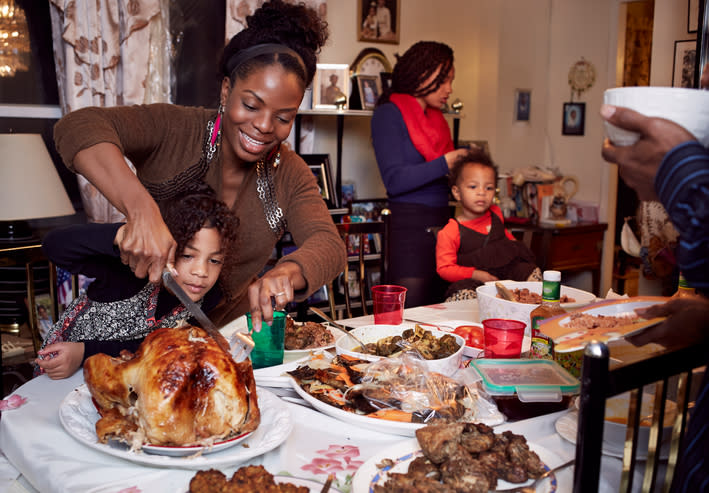Celebrating Thanksgiving as a person of color is complicated
Last year, I was harassed for celebrating Thanksgiving, an inarguably racist holiday built on the suffering of Native Americans. If you know anything about me, you know I am biracial. My dad is Black; my mom is white. I’ve always identified as a Black person. I talk about it a lot because while this identification is important to me, I don’t like arguing about it or defining it to other people.
I was working as a social media manager for a major company in the Pacific Northwest—one that prides itself on progressiveness. Like with many Seattle-based companies, its liberalism is often just a performance. I worked with one of the most mansplain-y people I’d ever met in my life at that company. (Ahem: He’s still there, I am not.) Of all the infuriating things he said and did, the following incident was the worst.
One day, that guy (a white man who also celebrates Thanksgiving, by the way) decided to wake up, head to work, and negatively engage me by discussing politics at the office.
He pushed back on my family’s choice to celebrate Thanksgiving, despite its racist history. This guy knew my family was biracial, and that I have a particular fervor when it comes to Black rights.
However, he didn’t know me well enough to know that I care about the lives of all people who are oppressed. He chose this time, in our open-concept workspace, to accuse me of not caring about Thanksgiving’s history. He accused me of not caring about the reason we celebrate. As if I were unaware of the fact that our country was founded entirely on injustice.
undefined

This man is younger than me. He got paid less than I did; he contributed less to the company. He had always shown his narrow-mindedness and blatant disrespect. When he said those words to me—literally spoke them to my face in front of our coworkers—I lost my cool. (But not too much of my cool because I was still a woman in a workplace, after all.)
Without swiveling my chair around, I sternly said, “Do not talk to me anymore today.”
He did not listen.
He kept pushing my buttons, asking me questions about how I felt about Thanksgiving, how my family felt, how my dad felt.
I finally snapped and told him that this was not an appropriate work conversation and I would no longer acknowledge him. I added a quick “Shut your mouth,” because what even was professionalism at that point? He got up, slammed his chair into his desk, and stormed out of the room…and was never reprimanded for any of it.
Needless to say, I continued having a hard time with that coworker. He was even the reason I ended up leaving the company six months later.
But—I hate to admit this—he really got me thinking about Thanksgiving. The holiday has always bothered me. I know the problematic history that preceded and followed it, so the “celebration” aspect has always felt strange and weighed on me. My discomfort has nothing to do with me being a Black person, but with me being a person who cares about people.
When this rude coworker accosted me for celebrating Thanksgiving, I started to consider why and how I celebrate Thanksgiving.
Thanksgiving has a complex history—as do most prominent things in our country. But unlike other holidays, I personally feel that Thanksgiving can be molded into something special for our individual selves and beliefs.
I don’t feel depressed or lonely if I spend the holiday alone or without family. If I want to eat chicken enchiladas or pancakes for dinner instead of turkey and stuffing, I don’t feel weird about it.
You can celebrate with friends (that’s why Friendsgivings are a thing, after all). You can have a traditional or non-traditional Thanksgiving meal with family, with just one other person, or with 30. I feel like there’s not much pressure to do something like there is on New Year’s Eve. It’s not romantic like Valentine’s Day. It’s not religious like Easter or Christmas.
For me, Thanksgiving is a day that can be whatever you make it.
Thanksgiving’s history is absolutely relevant now. I am not discounting people who don’t celebrate Thanksgiving for those very reasons—in fact, the people who refuse to partake in any holidays tied to racist or oppressive American history are my true heroes.
But for me and my family, it’s just about eating dinner together—something we rarely did when I was growing up.
It’s about cooking with my mom, drinking whiskey with my brothers, and watching movies together. To me, Thanksgiving is about family and being thankful that I have a family to spend time with and to love.
But there is something else we need to talk about—something important.
It is not appropriate to ask people of color, even those of us who can pass as white, to answer for every piece of America’s racist history.
My family is not the reason everyone’s family gets to sit down at Thanksgiving dinner and pretend nothing has ever been wrong in this country. Maybe your family is that family, but mine is not. For me and mine, who struggle and will always struggle with different identities, Thanksgiving is about being together. If you are the kind of person who feels like attacking a woman of color in the workplace about the holidays she chooses to celebrate, maybe you need to go volunteer at an organization that will teach you some compassion.
With that being said, happy Thanksgiving. I hope it’s what you make it.

